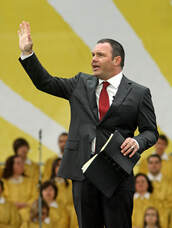 I geek out every time Apple releases a new iOS update. It's fun to see the changes, the new capabilities, and exploring more of what my phone can do. I had that love until the last one. Not because it wasn't a good update, but because it comes with a new feature: Screen Time. Every week it gives me a report that's both convicting and mind-numbing. I'm preaching through Ephesians at our church and the passage I'm working on now is a double gut punch. In Ephesians 5:15-16 Paul tells us to "look carefully how you walk, not as unwise but as wise, making the best use of time, because the days are evil." Other translations might say "redeem the time." Regardless, even though Paul had no idea how we'd use our time 20 centuries after he wrote these words, they still speak through the ages. For leaders, our time is our most precious resource. We can navigate financial constraints. We can work around volunteer or staffing limitations. But the one constant is that we'll always have the same amount of time. The best leaders learn to discipline their time and make the best use of it. But what we can't say is that we "didn't have time." If we want to make the best use of our time, what are some steps we can take? 1. Set limits on distractions - In our ADHD Squirrel world, we're so easily distracted by the ding of our email or our texts. Sometimes we need to protect ourselves from ourselves. So we need to close our browser, we need to shut down our email app, and we need to silence our phone. Very few distractions are worth our immediate attention. Unless your house is on fire or the President is calling, you don't need to feel bad letting it go to voicemail, responding later, or checking messages during some down time. 2. Put it away - I'm the worst about this, so this one is as much to me as anything else. My loathing of meetings goes back to being in staff meetings that droned on, and my only respite was answering messages or checking Twitter. I know. It's rude. It's disrespectful. I get it. I'm not moral grandstanding here. Just saying it's a problem. That's the first step, right? But if we want to give our undivided attention to people, sometimes we have to make the disciplined step to put our devices away. 3. Schedule - I put schedule blocks in when I will reply to messages and emails. If I don't, I'll be a slave to the constant dinging. Returning calls and messages is important, that's why it goes on my schedule. I don't ever want to be thought of as inaccessible. And when we as leaders don't schedule and don't prioritize following up with people, it's easy to get there. 4. Put it away, Part 2 - Putting it away after you get home is just as important, maybe more so, than putting it away in professional settings. This is one I need to get better at. It's easy to kick back and scroll in the evening when you're tired and just want to zone out. Put the phone on the charger, plug the laptop up, and leave it there. 5. Check your heart - We don't necessarily have to bow to a statue to be guilty of idolatry. Idolatry happens whenever we cling to, crave, or serve something or someone with our hearts more than we do God. We've replaced Him with a cheap substitute (see Romans 1), and we've given ourselves over to a god who cannot be satisfied nor will it relent. We can make idols of screens--not just our phones but our laptops and TVs and movie theaters or whatever else we look to for visual satisfaction. At the core, maybe we have a heart issue that needs to be conformed back to alignment with the Word? A helpful resource is the book 12 Reasons Your Phone is Changing You by Tony Reinke.
0 Comments
 Meh. Unfortunately if we were to pick an emoji to describe most churches, the “meh” would likely be the most common. Depending on where you look, anywhere from 65%-80% of churches are stagnated or declining. Hundreds of churches close every month, while hundreds more are on life support and draining through generations of savings in the bank. Meh just exists. As we look around the church landscape, our hearts should break at the number of churches who are content to simply exist. They’re not doing anything, they’re not impacting their communities, and if they closed down tomorrow no one would even notice. Churches that exist have the same routine: doors open, people come in, stand, sit, sing, sit, listen, leave. The next week they repeat, and the next, and the next. If we were to list out the symptoms of a “Meh” church, I would say these are the seven: The preaching lacks conviction - Preaching with conviction doesn’t mean brow-beating people or screaming at them. Preaching with conviction means that it is obvious to everyone in the room that the pastor believes what he is preaching and that the passage has gripped him. Pastors who preach without conviction are the first sign of a Meh church, because the opportunity to share God’s word becomes a routine or exercise, not an impassioned and overflowing joy to hear what God has said. There is no vision - Vision isn’t bound to a statement or a slogan, and it doesn’t have to be printed on a poster. Vision is where a church has an idea or dream of where they want to go. A church with vision has an idea of where they want to go, the community they want to reach, the impact they want to have. A Meh church goes week to week, at best month to month. They use those signs that say “Attendance this week… Attendance last week,” and people look and decide how things are going based on that. Busyness as a Substitute - Hamster wheels, treadmills, and NASCAR all have one thing in common: a lot of energy is used to go absolutely nowhere. No matter how hard the hamster or the Busch brothers push, in the end they’ve gone nowhere. When churches have busy schedules and tons of activities, they might be missing the point of what it means to schedule. Busy gives the appearance of effectiveness, but it doesn’t accomplish anything. Busy means things are added to a crowded calendar without a filter of asking “Why?” Programs & Ministries Continue Unquestioned - Not everything we do in a church or ministry is supposed to last forever. In fact the only thing is gathering for corporate worship (preaching, worship, giving, serving). Beyond that, everything has a life cycle, and an expiration date. Sometimes churches keep things going well past their expiration date (I’m looking at you Puppets!) and continue to invest resources, money, volunteers, and time to something that’s not effective anymore. Meh churches just let things keep going and don’t make the hard decision to put an expired program to pasture. Time & Money Priorities are Inward Focused - What a church spends its time and money on will speak louder than what it publishes and says. When a church’s calendar and budget are oversaturated with inreach and inward focus, the church has spoken volumes about its engagement in the community. When we over-direct resources towards ourselves, we’re essentially trying to keep everyone happy. Meh churches don’t care about lost people or their communities, as long as they have a good time together. Leadership is a closed, not revolving, door - On one hand we should be glad for people who serve faithfully in leadership for years, if not decades. But at the same time, if we’re not seeing new faces in leadership, serving on committees, nominated for deacon, and stepping into more responsibility, we’ve become a Meh church. Meh churches don’t look for new leaders or fresh faces because “it’s not broke.” A revolving door for leaders keeps ideas fresh, prevents burnout, and develops more faithful leaders. A closed door keeps things the way they are. Pastoral Tenures are Short - Tenure isn’t always an indicator, but if a church is burning through pastors every 3-5 years, there might be another option than “they used us as a stepping stone.” Pastoring a Meh church is difficult. Very few pastors come into a church with the approach of “I just want to exist, tend the garden, marry & bury, and preach some messages.” Pastors want to lead, they want to reach their community, they want to baptize, they want to disciple, they want to grow. A Meh church can cause a pastor to burn out keeping up with the busyness, or to walk away for another opportunity because they’ve tried all they could do. What do you see in Meh churches? How else can churches move from Meh and being content to exist towards health and effectiveness?  For the last few years, it has felt like a number of prominent Christian leaders in churches and ministries have found themselves in the headlines for all the wrong reasons. Our denomination watched one of its heroes dismissed, we've seen megachurches implode when domineering pastors were finally pushed out, and the Houston Chronicle blew the door open on an issue that should have never been allowed to happen. For a number of these, the sinking ship was obviously taking on water. Abusive leadership, nepotism, financial mismanagement, firing critics, lawsuits, and more only showed that there was a serious issue that had to be addressed. Because these leaders are in prominence, their shortcomings are wide open for everyone to see, and to comment on. Whatever our opinions are on whether or not a well-known leader has been disqualified or has rendered themselves unusable, it's imperative we avoid one response: mockery. Like Nelson from The Simpsons, it can be so easy to watch someone else fall (who very likely had it coming) and laugh. We can share memes, we can make light of it, we can sit back and point the finger and give all the reasons we wouldn't have done what they did. Behind so much of our response is a mocking, laughing, making light of what's tragic. Proverbs 24:17 tells us "Do not rejoice when your enemy falls, and let not your heart be glad when he stumbles."
Instead of mockery or moral grandstanding, our response to any instance of a Christian's fall should be grief. We should be glad for justice, especially in cases where justice is warranted and necessary. But behind our appreciation of justice should be an overwhelming sense of grief. We grieve for those wronged. Before anything else, we grieve for those who have been wronged. We grieve for those whose pain and suffering went unanswered for years. We grieve for those who were generous and were betrayed by embezzlement. We grieve for those who trusted a friend or a leader and were let down. If anything, the last year has taught us that victims deserve to be heard. We grieve for the shame of the church. Leaders who blow it don't do it on an island or isolated in an empire somewhere. They blow it in churches or ministries surrounded by real people, in a real community or city that is left to pick up the pieces of something that should have been trusted. Sometimes those churches never recover. Sometimes it takes years. Regardless of how long it takes, those churches bear the shame of the fallen leader. We grieve for the Gospel's witness being harmed. The message's power isn't lost, but its witness and trustworthiness is. People become (rightly) skeptical of a church who tells them one thing but did something completely different. We don't grieve because attendance numbers might go down or giving might drop. We grieve because eternity hangs in the balance of people Jesus loves and gave his life for. We grieve for the fallen leader and their family, who will be on the receiving end of the Internet's unceasing outrage. Whatever the faults were, and no matter how much pain has been caused, we should grieve for the family of that fallen leader. They didn't (usually) sign on to be a meme or caricature. We grieve because the fallen leader often cannot make restoration or redemption, they're simply shamed to the point of no return. So fellow pastors, let's grieve for a bit. The Church has taken its lumps this week. Quite honestly, we deserved it. And we've got our work cut out for us for our witness in our communities and in our culture. But let's get back to work. Jesus promised the Church would endure. And endure we will. But for now, let's grieve. There are so many things about being a leader that are, well... fun. It's really enjoyable to dream and cast vision. It's great working with a team you love. It's something to wake up to when you realize your day is going to make a difference in someone's life. But it's not all fun and games.  That's why I love what Eric Geiger has always said about leadership. When we step into leadership roles, whether it's in a business or nonprofit or even in a church, we're going to have to start a fire. We'll have incompetence in a staff position, we'll have a moral failure in another leader, we'll deal with brokenness and painfully bad decisions someone else makes, and more. And that's when we have to set a fire. We have to deal with the bad news that we've gotten. Fires aren't fun, ever. They burn, they damage, and even though we all know they're necessary, it doesn't make them any less difficult. The kind of fire we start is what matters.  We can, as leaders, choose to take a Scorched Earth approach. In this, everything gets toasted. You find out something happened and it blows up, literally. Someone in a moral failure is dragged in front of the church and forced to apologize (such as when a young woman gets pregnant outside of marriage, funny the guy doesn't have to wear the scarlet letter). A team member makes a minor mistake and is beat down with a verbal barrage. A family going through difficulty is forced to live it out and even those not affected have to answer. Scorched earth doesn't work. It leaves nothing behind. Leaders fail when they adopt a scorched earth approach because there's nothing left to be redeemed. Sure you got the point across, but what's left behind? Ashes and charred remains. Nothing can grow and nothing can be restored for years, if ever. That said, in very rare and very extreme cases, sometimes you need to just torch everything. News broke this morning of a church leader who ruled with an iron fist and was a dictator. That's a time where the elders and leaders have to torch it. You have to deal hard with hard issues, but only when there's no other option. Same thing where a volunteer or worker gets popped for messing with a kid. There's no "second chance" on that. But these cases are rare and exceptional.  The other approach is the Controlled Burn. One of the perks of living in Florida is we don't have wildfires very often. We get hurricanes, Florida Man, alligators, pythons in ponds, crazy thunderstorms, and Disney tourists. But we don't get wildfires. What's blown me away about wildfires is that one practice to stop a wildfire is to do a controlled burn. In a controlled burn, a fire is carefully set and controlled in order to rob the raging wildfire of its fuel to burn out of control. Leaders who take a controlled burn know there's going to be damage, know there's going to be fallout, know that people will be hurt, know that this isn't going to be much fun. But rather than torch everything, they're careful, intentional, loving, and restorative about the fire they set. In this, there's always the opportunity for redemption. There's always the opportunity for healing and growth. The burn is done in order to minimize damage and maximize hope. Controlled burns don't dismiss the severity of the situation, nor do they give a pass for bad behavior. The fact they're controlled means that the impact is limited to the specific person or situation and doesn't destroy things unnecessarily. Yes there's pain, and as a leader you might have some fallout to deal with. But it's not widespread. It's not catastrophic. And most of all, it's left room for healing and restoration. For a family with a wayward child, it means not condoning but also leaving a light on and coffee on the table. For a staff member with a moral failure, it means discipline and termination but also care and ministry to the family. For the worker who puts a hole in a window, it means paying for the window without dragging their name through the mud on Facebook. Pastors and leaders, how do you make sure you're doing controlled burns? If you were to rank the responsibilities of a pastor, the top one would be preaching. It's the most visible thing we do. It's what we're most known for. It's what we're expected to do week in and week out. And because it's our top priority, it's what we should devote the bulk of our time to. But how long should it take? When I was in seminary I remember hearing someone say that a minute in the pulpit = an hour in the study. If you're in a church that does Sunday morning, Sunday night, and Wednesday night you're looking at anywhere from 80-100 minutes each week of preaching. Congrats pastor, you can catch a couple hours of sleep on Thursday afternoon. Instead of focusing on study time as a direct correlation with the amount of time you spend preaching, I loved how this article from The Gospel Coalition ended: sermon preparation takes "however long is necessary." Everyone has a different flow and capacity for what they're able to do. Some of us are speed readers who can work through commentaries quickly, others of us are slower readers who have to labor more intensively to retain what we've read. Some of us can flesh an outline out quickly and others of us have to stare at a white board and make connections to try to figure out what a text is saying. Whenever you're preaching a passage, your study should focus on how to take what the passage says, explain what it means, and give practical application for it today. We should strive to avoid two pitfalls of pastoral ministry: 1. Spending too little time in preparation - Acts 6 makes it clear that the role of elder/pastor in the church is primarily the preaching of the Word, but it's not all there is. Pastors still must lead, do administration, counseling, shepherding, discipling, and the "whatever it takes" to serve a congregation. We fail our primary task when we let our time be overrun with the secondary responsibilities. And when pastors are ruled by secondary responsibilities they run the risk of becoming nothing more than a chaplain/gardener who tends the garden until everyone's dead. What suffers in the gardener ministry? The proclamation of the Word. Preaching becomes weak, trite, shallow, and malnourishing. Instead of giving strong meat, we're giving chewed up bread. 2. Spending too much time in preparation - I actually believe pastors can spend too much time in sermon preparation. Spending too much time in study and preparation means that the primary responsibility has become the only responsibility. When we spend too much time in preparation sometimes we overthink the passage, where we make bigger mountains than the text allows, or we try to dive into every possible rabbit hole. More pragmatically, when we spend too much time in preparation we're failing to live and serve among our congregations. The difference between a speaker and a pastor is that a pastor knows to whom he's preaching. We know to whom we preach because we spend time with them, we invest in them, we're in hospitals and living rooms.
 The worst hire to make is the wrong hire. Not only the cost of interviews, bringing in a candidate, paying a consultant or outside perspective, and the cost of any severance or buyout required to move on. But beyond the financial cost, there’s other expenses that can’t be recorded on a ledger sheet. The leadership loses a little bit of its credibility and trust after bringing in a bad hire. It will then be more difficult the second (or third or fourth) time around when an opening requires a hire. Obviously you can’t tell everything in an interview or screening process. Those, though good, aren’t perfect. Someone can absolutely dazzle in an interview and then when they’re on the job they flame out as a dud. Or someone can be awful in the interview process but turn out to be a great hire who happened to have a bad morning. Whenever you’re looking at bringing in a new team member, you not only want to see what they can do, but also who they are. This is especially true for ministry, where the qualifications for pastoral ministry are overwhelmingly character > competency. And in the church, because what we do is intensely personal and interactive, we have to make sure we’re bringing the right people on board. Jim Collins called it “making sure the right people are on the bus in the right seats.” The wrong person in the wrong seat can make it difficult for any ministry to move towards vision. I wrote a whole book on developing a team climate in ministry, where I put a ton of emphasis on chemistry as the missing ingredient for most church staffs. Though they’re not perfect (every hire and on-boarding requires a tremendous amount of faith and trust in the provision of God), we should try to ask 6 questions about every new hire.
What questions do you ask in a new hire process?  The Patriots won (again), the commercials were lame, and the halftime show featured some bizarre combination of Maroon 5 and a rapper in a fur coat. Now that the Super Bowl is over, a whole tribe has emerged: the Haters. The Haters are known for their hot take tweets during and after the game: “This is exactly what the NFL wanted! Another Pats win” (Remember that time the NFL was willing to go to the Supreme Court over the PSI of a ball? And took away draft picks over Spygate? And how awkward Goodell is every time he hands over the trophy?) “The refs should be the MVP for New England” (Are we forgetting the reason the Rams are in the game is because of a blown call? And that MJ totally shoved Byron Russell out of the way?) “Edelman shouldn’t have won MVP because he juiced” (Alright I’ll give you this. But he took the suspension mandated by the league at least) Why do the Haters exist? Quite simply, I think it’s because many people resent others’ success. It doesn’t have to be in sports. It happens in business, in education, at work when someone else gets a promotion, and dare I say it… in the church. When the megachurch across town reaches hundreds of people each week and expands to another campus, the Haters respond with “Well people are going for the circus” or “They’re just a stage show entertaining.” When the faithful pastor gets called to another church, the Haters reply with “He just used them as a stepping stone.” When someone gets invited to speak at a conference, the Haters reply with “He’s just interested in building his brand.” The list goes on and on. As Christians, and especially as pastors, we’re not immune to being Haters when others have success. In fact, I would argue that one of the markers of our maturity as a leader isn’t how we respond to our success, it’s how we respond to others’.  As pastors, it’s important for us to steer clear of becoming one of the Haters.
|
Scott M. DouglasA blog about leadership and the lasting legacy of family ministry. Archives
August 2023
Categories
All
|
 RSS Feed
RSS Feed



